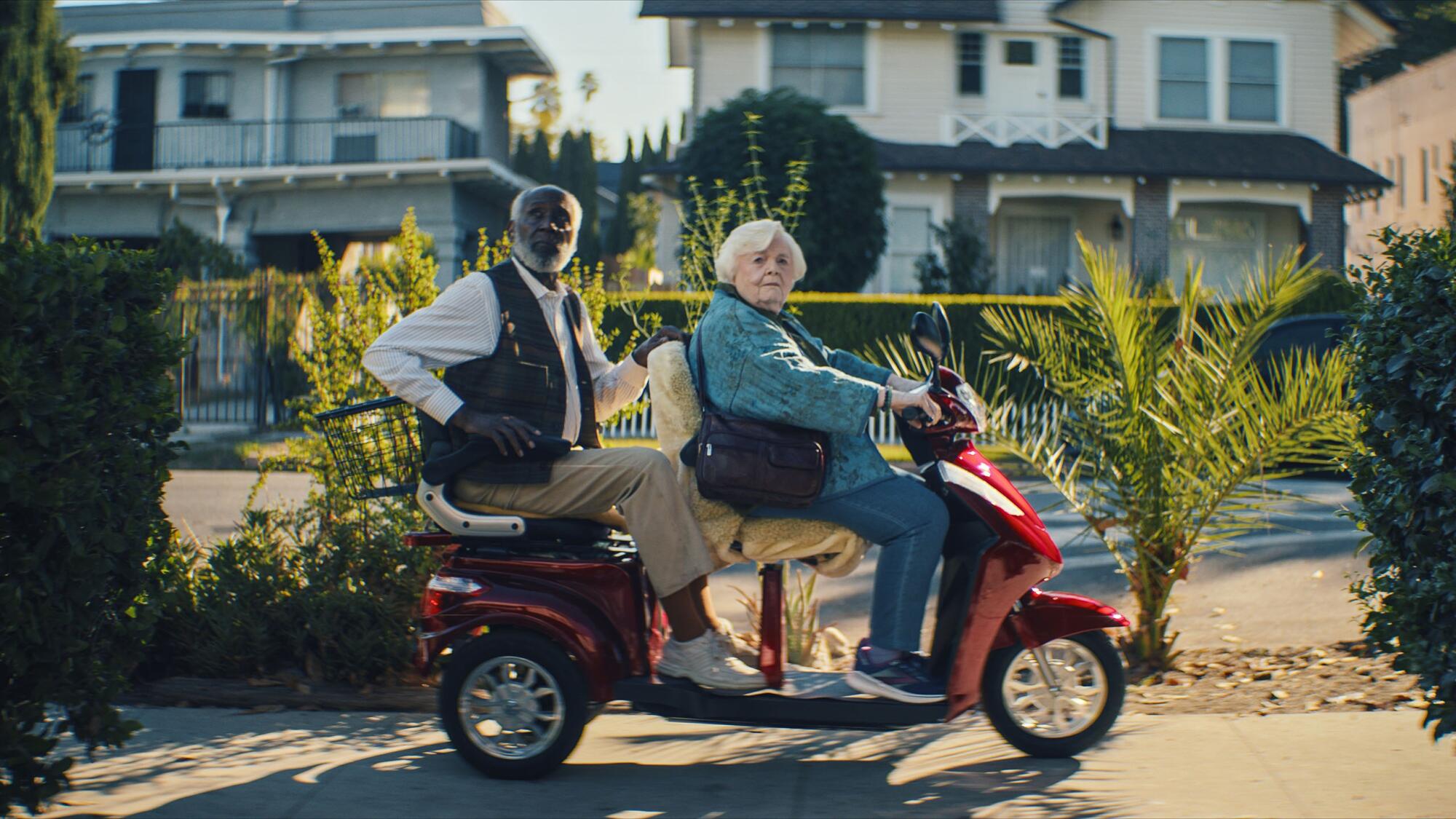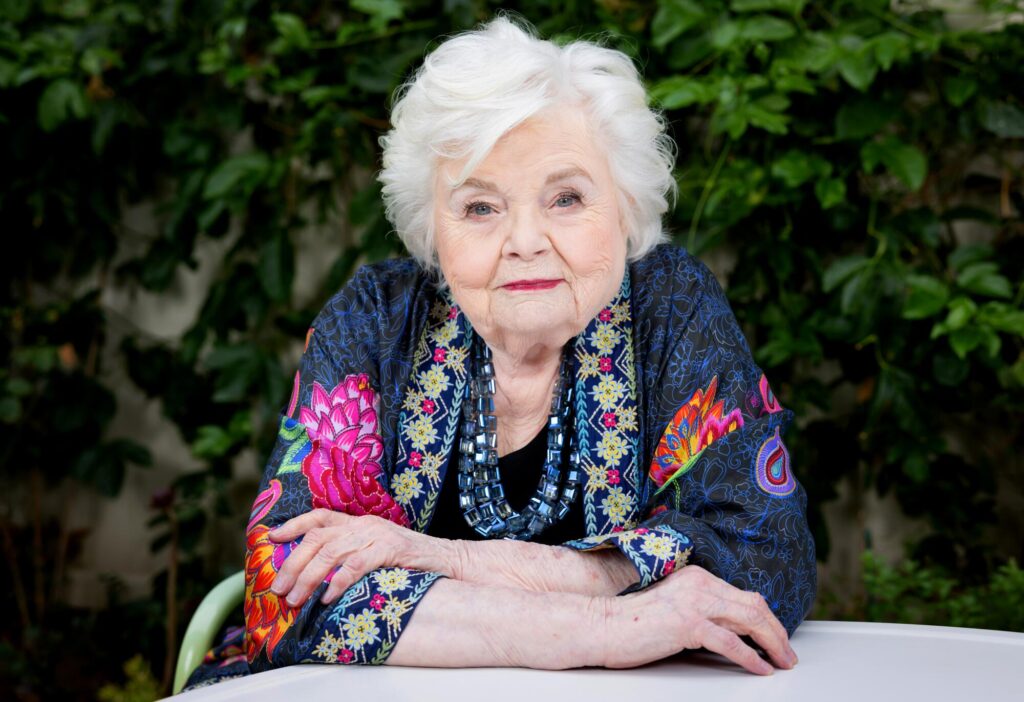It makes sense that the script for writer-director Josh Margolin’s feature debut, “Thelma,” ended up in June Squibb’s hands not through her agent but via her “The Humans” co-star Beanie Feldstein, who thought Squibb would be perfect for the role of a sweet-natured nonagenarian who, swindled out of $10,000 by a phone scammer, decides to get her money back. After 70-plus years in the performing arts, it seems like everyone who works with Squibb, now 95, walks away admiring her wry comic timing, naturalistic delivery and preparation.
And why not? She’s been at it since her grandparents earned free beers in exchange for the young Squibb’s tap dancing on varnished-wood bars in Vandalia, Ill. Squibb can regale you with tales of working on cruise ships, in regional theater and on film and TV. But it wasn’t until 2013, after her Oscar-nominated performance as a blunt-talking matriarch in Alexander Payne’s “Nebraska,” that Hollywood recognized her as a powerhouse. Since “Thelma,” her first starring role, Squibb can feel the increased attention as soon as she steps out her front door. “There’s been a lot more hellos,” she says of the neighbors in her sprawling San Fernando Valley apartment complex.
“So many times they can do more than what they’re given credit for,” June Squibb says of the elderly. “I think I can do more than people give me credit for. And my God, people give me a lot of credit.”
(Christina House/Los Angeles Times)
“Thelma” is loosely based on true events. Did you use Josh Margolin’s grandmother as source material?
I did a bit. Josh gave me short films of Thelma going to the supermarket, having a birthday party, being in the car. I saw her physically and began to get a sense of how she approached life. I knew she grew up in the New York area and came out here with her husband, who made films. I’m sure she gave him ideas, because her mind at 104 is amazing.
“Thelma” has been categorized as an action comedy. But it also explores the infantilization of the elderly by their loved ones.
We don’t know what the aging person is capable of. If it’s family, we can begin to sense what they can and can’t do. But I think so many times they can do more than what they’re given credit for. I think I can do more than people give me credit for. And my God, people give me a lot of credit. [laughs]
What was the trick to convincing producers that you could handle the mobility scooter that Thelma takes off in?
They brought the scooter here with the stunt coordinator, and we went out on a circular driveway. They all thought I was going to kill myself. The stunt coordinator was running along beside me the whole time to make sure that if I fell, he could catch me. But I proved to them I didn’t need a stunt double.
In some scenes, your co-star Richard Roundtree rides on the back. Did you feel like you had to keep him safe?
I don’t think I ever thought that. [laughs] They just all began to have faith in me, and I think Richard had faith in me, and I had faith in myself. I just thought, “I can do this.” It never occurred to me that I should say, “Oh, I don’t know if Richard should get on behind me.” I knew I was responsible for him.
Can a line be drawn between your being a trained dancer and your ability to pick up things quickly?
Well, I danced a lot. I did an awful lot of musical theater, mostly the comedienne route.
In fact, you made your Broadway debut in “Gypsy,” as a stripper, Electra, and there was a lot to that name, wasn’t there?
[laughs] There were lights on my breasts and on my butt, and the costume was very heavy because they had heavy batteries. And I did this [presses imaginary switches with her thumbs] to make them go on [when I danced].

“I knew I was responsible for him,” June Squibb says of driving Richard Roundtree around on a scooter in the movie “Thelma.”
(David Bolen / Courtesy of Sundance Institute)
We all need an anecdote about Ethel Merman, who starred as Rose, the overbearing stage mother.
She was wonderful. She’d tell me a dirty joke onstage every night.
Wait. Every night?
Every night. There was this part where I was behind a scrim, in the dark, and I was flicking the light bulbs, and she would scoot up behind me, and go [in Merman’s brassy voice], “June! June!” and she’d tell me a dirty joke. The audience could see me through the scrim, but they couldn’t hear us. She just loved dirty jokes. And I was stuck there. [laughs]
“Thelma” premiered at Sundance to great acclaim. What was that like?
It was the most exciting thing in the world. That audience, my God, I’ve never had such love. Not even just love for me but for all of us. They had a big party and people were trying to get into it. They took me into the party space, and they sat me in a chair, and everybody came to me. And it was wonderful. I didn’t have to move. [laughs]

